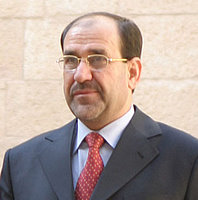Iraq is moving toward a resolution of the messy political jockeying that followed its March 7 parliamentary elections. But despite some surprises, and the torturous process itself, the likely outcome remains a continuation of the status quo ante.
The previous government was dominated by Prime Minister Nouri al-Maliki and the so-called Quartet Coalition, formed in 2007 after the collapse of Maliki's initial coalition. It included Maliki's own Shiite Islamist Dawa Party, rival Shiite Islamist party the Islamic Supreme Council of Iraq (ISCI), and the two main Kurdish parties. Sunnis and secular Shiites were in the opposition. Shiite and Kurd leaders have signaled since March 7 that this same coalition would be the election's likely result, and the past three weeks have virtually sealed that outcome, even if Maliki's re-election is not assured.
The results of voting indicated that Iraqis wanted change, with a move from sectarian parties to more-nationalist formations. Of the 325 seats allocated, the two nationalist blocs -- Iyad Allawi's Sunni Arab/secular Shiite Iraqi National Movement (INM) and Maliki's State of Law Coalition -- won the most, with 91 and 89 seats respectively. The Iran-backed Iraqi National Alliance (INA) trailed with 70. Despite Allawi's surprise plurality, which came by uniting the Sunni opposition, his poor showing among Shiites increased the Shiite Islamist seat total from 47 percent to 49 percent, giving the parties of the old Shiite-Kurd coalition a strong majority.

